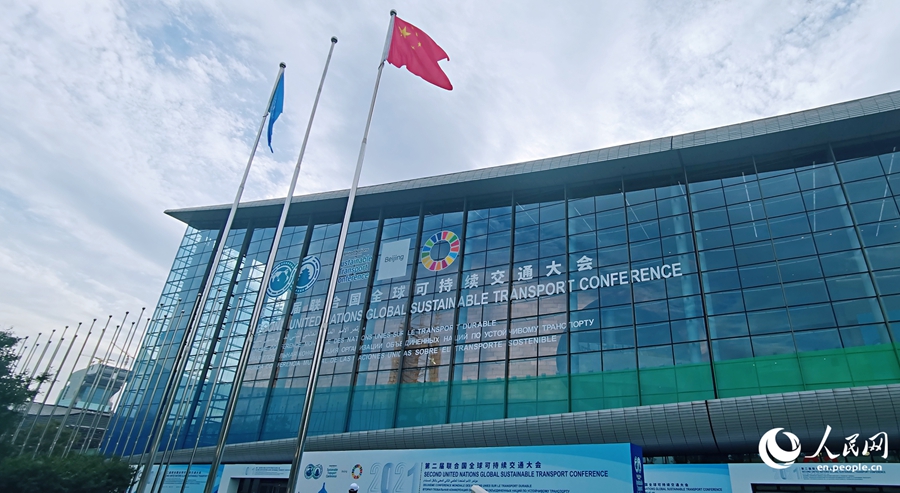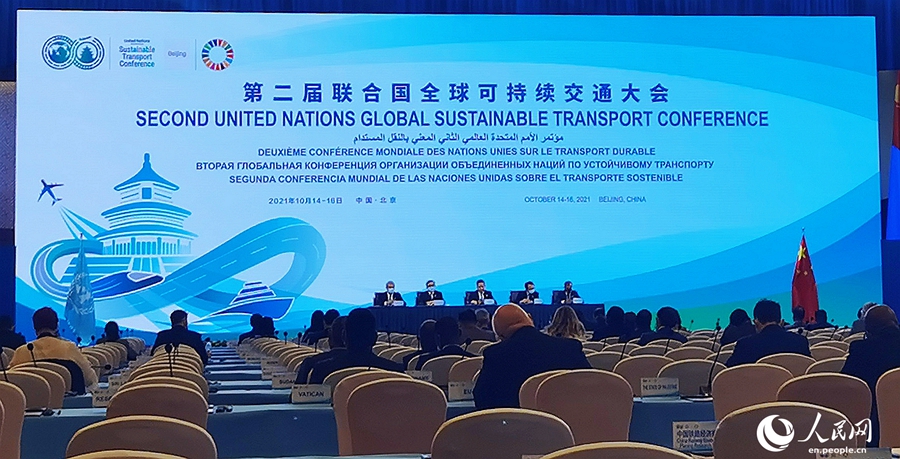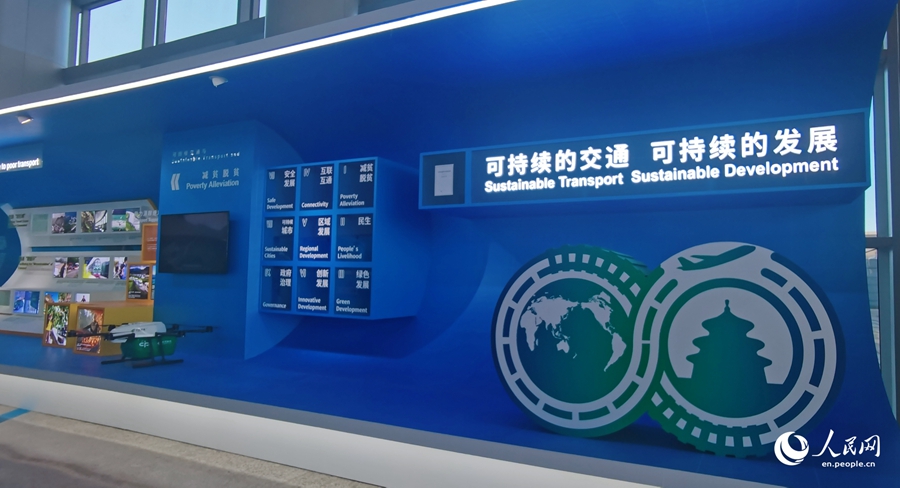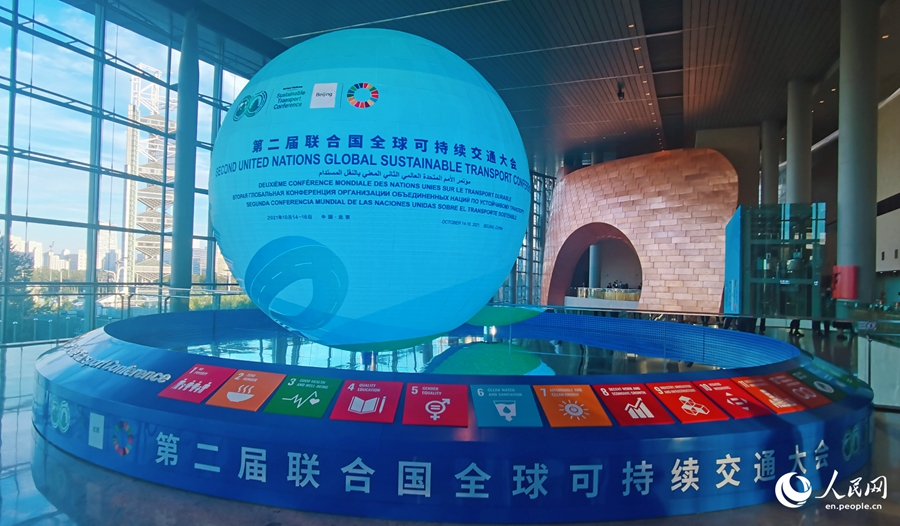Sustainable Transport Conference draws blueprint for global sustainable development

The Second UN Sustainable Transport Conference was held from October 14 to 16 in Beijing, capital of China. (People's Daily Online/Xian Jiangnan)
The Second UN Sustainable Transport Conference, which brought together thousands of government leaders, industry experts and civil society groups from over 100 countries, concluded on October 16, 2021 in Beijing, with a call to adopt integrated, interdisciplinary, and cross-sectoral approaches to sustainable transport.
With the theme of "Sustainable Transport, Sustainable Development", the three-day conference focused on the challenges and opportunities for the transition to sustainable transport and sought to provide concrete solutions for how to plan and design transport systems to ensure that the pathway to achieving sustainable transport — transport that is safe, accessible, green and resilient — is at the scale and speed required.
Speaking highly of the conference, participants agreed that without a profound shift towards sustainable mobility, achieving the goals of the Paris Climate Agreement and the Sustainable Development Goals (SDGs) would be impossible.
Teaming up for global solutions

Government leaders, industry experts and civil society groups attended the Second UN Sustainable Transport Conference both online and offline. (People's Daily Online/Xian Jiangnan)
Transport is one of the single largest contributors to air pollution and carbon dioxide emissions globally and has an important bearing on sustainable development globally. Sustainable transport is being mainstreamed across several SDGs and targets, especially those related to food security, health, energy, economic growth, infrastructure, cities and human settlements.
With the world grappling with global challenges such as climate change and COVID-19, the conference, which has been delayed a year and a half later than originally planned due to the pandemic, came as a highly relevant one as the world stands on the cusp of a transport revolution that requires sound direction.
Chinese President Xi Jinping said at the opening of the Conference via video message that major changes unseen in a century, compounded by a once-in-a-century pandemic, are posing serious challenges to the global efforts of growing the economy and bettering people's lives. "It is imperative that we follow the prevailing trend of world development, advance global transport cooperation, and write a new chapter featuring connectivity of infrastructure, unfettered flows of trade and investment, and interactions between civilizations," Xi said.
UN Secretary-General António Guterres noted that COVID-19 has pushed an estimated 120 million people into extreme poverty, 160 million into a state of hunger, and set back education for around 100 million children, adding that we are further from realizing the Sustainable Development Goals on climate, ocean, and biodiversity than we were when they were agreed six years ago.
There is increasing recognition that sustainable transport can spur economic growth and protect the environment. According to the World Bank, a transition to sustainable mobility could deliver savings of US$70 trillion by 2050, when considering full transport costs, including vehicles, fuel, operational expenses, and losses due to congestion. Better access to roads could help Africa become self-sufficient in food and create a regional food market worth US$1 trillion by 2030.

Photo shows a demonstration zone at the Second UN Sustainable Transport Conference in Beijing, capital of China. (People's Daily Online/Xian Jiangnan)
Participants said the COVID-19 pandemic underlined the significant role that the transport sector plays in building communities and supporting livelihoods, and new technologies can help to further revolutionize this sector.
Gong Ke, President of the World Federation of Engineering Organizations, reckoned that the advent of a new round of scientific and technological revolution and the fourth industrial revolution has opened up possibilities for new energy sources, materials and technologies, providing unprecedented opportunities for the development of sustainable transport.
According to Nebojsa Nakicenovic, Deputy Chair of the Group of Chief Scientific Advisors to the European Commission, new technologies such as virtual mobility, hydrogen energy and digitalization are laying a foundation for achieving sustainable transport. Resilient, low-carbon and environmentally friendly mobility is needed in the digital age, and it requires synergy at intergovernmental levels, rather than partial solutions, he concluded.
During the Conference, the UN Secretary-General called for the decarbonization of all means of transport in order to get to net-zero emissions by 2050 globally. He specifically called for phasing out the production of internal combustion engine vehicles by 2035 for leading manufacturing countries, and by 2040 for developing countries; for zero emission ships to become the default choice, and commercially available for all by 2030, in order to achieve zero emissions in the shipping sector by 2050; and that companies start using sustainable aviation fuels now, in order to cut carbon emissions per passenger by 65 per cent by 2050.
Chinese wisdom for the world

Photo shows a demonstration zone at the Second UN Sustainable Transport Conference in Beijing, capital of China. (People's Daily Online/Xian Jiangnan)
As a major country that shoulders its responsibilities, China is committed to implementing the United Nations 2030 Agenda for Sustainable Development, and takes an active part in global transport governance so as to contribute Chinese wisdom and strengths to sustainable development throughout the world.
According to Liu Zhenmin, the UN Under-Secretary-General for Economic, Social Affairs, China has made remarkable progress in sustainable transport and has some experience to offer to other developing countries, and that partly explains why the UN has chosen China to host this year's Conference.
"Convinced of the importance of global connectivity, we have become the economy best connected to the global shipping network and with the highest volume of trade in goods," Xi said, citing that during the COVID-19 pandemic, the China-Europe Railway Express and ocean-going cargo vessels have been running day and night to keep global industrial and supply chains stable, showcasing China's sense of responsibility in the global community.
China's Minister of Transport Li Xiaopeng noted that China's transport sector has actively responded to the pandemic, providing strong support for epidemic prevention and control as well as the resumption of work and production, thus consolidating the achievements in poverty alleviation.
Li added that China has provided vaccines to over 100 countries and international organizations, exported epidemic prevention materials to more than 200 countries and regions, and shared its epidemic prevention and control experiences with other countries through platforms such as the International Maritime Organization.
Xi stressed that China will continue to advance high-quality Belt and Road cooperation, strengthen infrastructure connectivity with other countries, and develop a green Silk Road and a digital Silk Road at a faster pace. He announced that China will set up a Global Innovation and Knowledge Center for Sustainable Transport, as a contribution to global transport development.
The Conference concluded with the Beijing Statement, which called for adopting integrated, interdisciplinary, and cross-sectoral approaches, supported by greater international cooperation.
"The Beijing Statement depicts the future of global sustainable transport development," Li said. "It proposes strengthening international cooperation in the transport sector, which offers a framework for the implementation of related goals sought by the United Nations 2030 Agenda for Sustainable Development."
Photos
Related Stories
- Roundup: Xi's speech inspires confidence in progress of global sustainable transport, experts say
- Transport turns world into global village: Xi
- Xi stresses leveraging role of transport to achieve common prosperity
- Highlights of 2nd UN Global Sustainable Transport Conference
- Xi urges global transport cooperation, common development
Copyright © 2021 People's Daily Online. All Rights Reserved.










